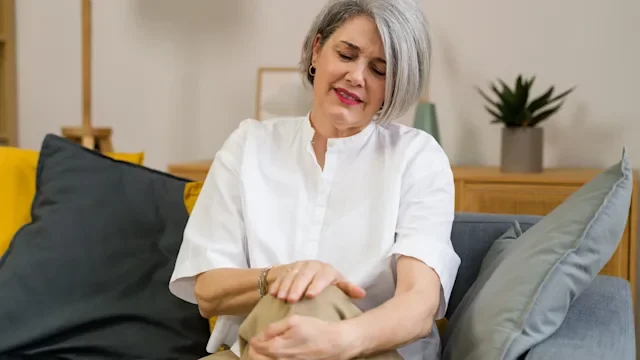Key takeaways:
Ulcerative colitis is an inflammatory bowel disease that causes inflammation of the colon.
The most common symptoms of ulcerative colitis are bloody diarrhea and abdominal pain. But many people also experience constipation.
Treatment for ulcerative colitis can stop inflammation and, in turn, improve constipation. Staying hydrated and eating a high-fiber diet can also help.
Ulcerative colitis is a type of inflammatory bowel disease that causes inflammation of the colon. It isn’t clear why some people develop ulcerative colitis. But colon inflammation can lead to many uncomfortable symptoms. One symptom that doesn’t get a lot of attention is constipation. Here’s what to know if you have ulcerative colitis and experience constipation.

Does ulcerative colitis cause constipation?
Yes, some people with ulcerative colitis experience constipation. It isn’t clear how often people develop ulcerative colitis constipation. In one study, only about 12% of people with ulcerative colitis reported experiencing constipation. But other studies report that as many 1 in 3 people with ulcerative colitis experience constipation.
Why are ulcerative colitis and constipation connected?
The relationship between ulcerative colitis and constipation isn’t completely clear. Experts believe that inflammation from ulcerative colitis flares can damage the colon and lead to constipation. It’s hard for scientists to prove how this works because, until recently, tools that measured colon movement weren’t very precise. And many of these tools caused discomfort when used, so people were less willing to participate in studies. But newer tools are more precise, so scientists are now learning more about how ulcerative colitis affects the colon.
Here’s what the research says so far about ulcerative colitis and constipation.
Uncontrolled inflammation gets worse over time
Treatment for ulcerative colitis can stop inflammation. This stops ongoing damage to the colon. But, if you don’t get treatment, inflammation gets worse, and colon damage builds up over time. The long-term damage affects more than just the lining of the colon: It can also start to affect the nerves in the colon.
Colon movement becomes disorganized
The gut’s nervous system, called the enteric nervous system, controls the muscles in the colon. These muscles are what generate gut movement. Gut movement allows food to pass through the gut for digestion. It also allows stool to pass through the gut and out of the body.
In people with ulcerative colitis, inflammation can damage the nerve cells that generate the electrical signals that set off these chain of events. When these cells don’t work properly, you can develop constipation. This damage can last even if you receive treatment for ulcerative colitis. This is why some people continue to experience constipation even if their other ulcerative colitis symptoms go away.
Stool starts to accumulate
Other signals also trigger gut movement. The gastrocolic reflex is a reflex that gets triggered when you eat. It’s the reason you may feel the need to poop about 15 to 90 minutes after eating a meal. Studies suggest that the gastrocolic reflex doesn’t work the way it should if you have an ulcerative colitis flare. This can lead to stool buildup and increase the risk of developing constipation.
Food and inflammation: Here are the best foods to reduce inflammation in your gut.
Getting ready for a colonoscopy: Choose the best colonoscopy prep for you, with help from our experts..
Not sure which treatment to try? Our ulcerative colitis treatment guide can help.
Stool passes quickly through inflamed parts of the colon. But studies suggest that stool actually moves more slowly through the unaffected parts of the colon that precede areas of inflammation. This can lead to stool accumulation in the right side of the colon. This stool starts to dry out, which leads to constipation.
Can you prevent constipation from ulcerative colitis?
It may not be possible to completely prevent constipation from ulcerative colitis. But there are steps you can take to lower your risk.
Get treatment for ulcerative colitis
Getting treatment for ulcerative colitis can lower your chances of developing long-term constipation. Treatment can help you avoid flares and achieve remission. This can keep you healthy and help you avoid constipation. But it’s important to start treatment early, since people who have more flares are at higher risk for developing long-term damage to the colon. Long-term damage can increase the risk of lingering constipation, even after a flare resolves.
- PrednisoneGeneric Deltasone and Rayos and Sterapred
- MedrolMethylprednisolone
- KenalogTriamcinolone
Work with a dietician
A registered dietitian is an important member of your inflammatory bowel disease (IBD) care team. Your dietitian can help you create a nutrition plan that’s IBD-friendly. They can help make sure you’re getting enough fluid and fiber, both of which can help with constipation. And they can help you adjust these things during flares so that your symptoms don’t get worse.
Try an over-the-counter (OTC) medication
Over-the-counter (OTC) laxatives and stool softeners can help if you’re experiencing constipation. But you should check with your gastroenterologist before trying any OTC constipation medications. Your gastroenterologist can make sure these medications are safe for you to take and don’t interact with your other treatments. They may also recommend a prescription-strength laxative instead, depending on your specific situation.
When should you seek care for constipation from ulcerative colitis?
Talk with your IBD team if you’ve been experiencing constipation. Whether it’s a new symptom or something you’ve been struggling with for a while, your team can help you find the right treatment.
But you should seek immediate medical care if you suddenly develop constipation during an ulcerative colitis flare.
You should also seek immediate medical care during a flare if you develop:
Fever
Severe abdominal pain
Heavy bleeding from your rectum
Large amounts of bloody stool
Dizziness or fainting
Fast heart rate
Inability to eat or drink
The bottom line
Ulcerative colitis is an inflammatory bowel disease (IBD) that affects the colon. Constipation can be a symptom of ulcerative colitis. Getting treatment for ulcerative colitis can help you avoid constipation and other symptoms. Work with your IBD team, including a registered dietician, to find the right tools to treat your ulcerative colitis constipation.

Why trust our experts?


References
Crohn’s & Colitis UK. (2023). Constipation.
Haase, A. M., et al. (2016). Regional gastrointestinal transit times in severe ulcerative colitis. Neurogastroenterology and Motility.
Lamb, C. A., et al. (2019). British Society of Gastroenterology consensus guidelines on the management of inflammatory bowel disease in adults. Gut.
Miller, C., et al. (2020). Constipation in ulcerative colitis: Pathophysiology and practical management. Frontline Gastroenterology.
Reddy, S. N., et al. (1991). Colonic motility and transit in health and ulcerative colitis. Gastroenterology.
Yamamoto, Y., et al. (2023). Severity of nocturia and constipation in patients with ulcerative colitis. Urology.














